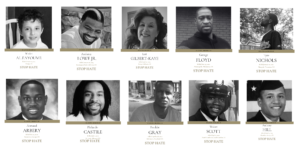
In a heartfelt tribute, Casa Cálculo Cultural pays tribute to the victims of hate crimes with a captivating altar against hate at the San Mateo County History Museum during Día de Muertos in Redwood City, California. This moving ofrenda is a powerful symbol of remembrance and collective determination to confront the destructive forces of hate.
Hate is a strong, intense feeling of extreme hostility toward a person, group, or idea. It often arises from deeply rooted prejudices, fears or negative perceptions in society.
